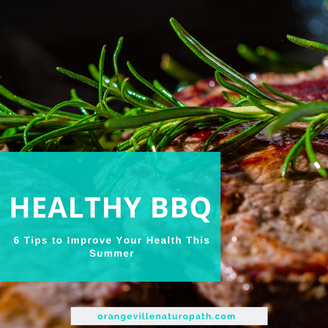Health-ify Your Summer
1. Choose fresh
When foods come pre-made they typically contain a lot of extras for flavour and preservation (AKA... chemicals). Check the ingredient list on a box of hamburgers/veggie burgers or a package of hotdogs - if there are more than 4-5 ingredients you might want to rethink it. Pre-made foods are for those one-offs like camping or parties, but not for everyday.
- Instead: make your own burgers, buy fresh sausages that don't have fillers, go for chicken breasts or drumsticks
2. Add Antioxidants
The reaction that occurs when fat hits fire creates heterocyclic amines (HCAs), and it happens much more quickly when using higher temperatures like the BBQ. These HCAs are carcinogenic, so we want to neutralize them as best as possible.
- Instead: marinate meats with rosemary or other herbs, and pair your meal with broccoli or other cruciferous vegetables (cauliflower, kale, Brussel sprouts) that offer protection from these compounds.
3. Diversify
My favourite barbecued foods are actually not meat; I love to use portobello mushrooms, zucchini, and peppers. Grilled vegetables are so delicious that I could honestly just eat a plate of them with nothing else. I also like to use the leftovers the next day on a salad. I've heard a lot of people are liking the "Beyond Meat Burgers", or you can make your own vegan or veggie based burgers (I really like the combo of sweet potato and black beans).
- Try:vegan burgers using 1 tbsp chia or flax seeds mixed with 3 tbsp water for an egg replacement.
4. Meat Origins
We have some great local farms around that raise grass-fed and hormone free animals. If you eat meat more than once a week, you'll want to consider the impact of consuming conventionally raised meat and poultry, not just for your own health but also buying direct will save you money.
- Support local: there are so many reasons to do this.
5. Sugar
I definitely enjoy the odd sweet, but I prefer to have it as dessert, not hidden in foods when I don't know it's there. In the summer, watch for sugar in barbecue sauce, dressings (coleslaw), marinades, sauces, popsicles, ice cream, alcoholic beverages, juice.
- Instead: make your own dressing, choose pesto or hot sauce over some other sauces, read labels, use sparkling water instead of pop, buy a popsicle mold to make your own, or eat frozen fruit.
6. Hydrate
Often we misread the signal for thirst as a hunger cue. If you find your appetite has gone up, try drinking more water first to see if that takes care of it. Many of us are mineral deficient, which means we will have trouble getting water into our cells. Learn more about hydration here.
- Try: lemon water first thing in the morning with a pinch of salt to help absorb water.
Bonus Tip: Watch the bread and skip it when you can.
Recipes:
Creamy Rainbow Coleslaw
Portobello Veggie Burgers with Goat Cheese
Greek Chicken Burgers
Broccoli Salad
Spiced Salmon Kabobs
Spring Vegetable Pasta Salad
Virgin Raspberry Mojito
I wish you a very Happy Canada Day and a healthy kick-off to summer,
Dr. Christa


 RSS Feed
RSS Feed